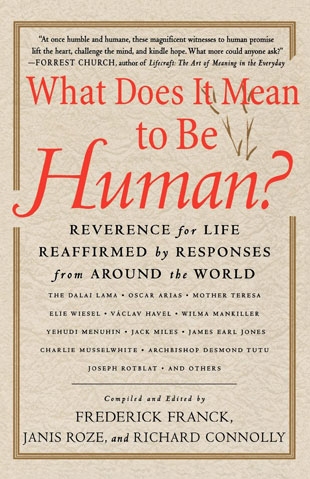"The words contempt for life had fallen again, and that made me think at once of 'Reverence for Life,' Albert Schweitzer's life motto that he lived from 1915 to his death in 1965. Reverence for Life is the one principle on which a viable ethic can be founded. I saw him apply it in practice while serving on his medical staff in Lambarene, from 1958 to 1961. Reverence for Life was the guiding principle in everything he did. It was totally free from sentimentality. It was simply the avoidance of inflicting unnecessary suffering on any living being and the alleviation of suffering with all the medical and human means at his disposal. Reverence for the mystery of life was for him the basis not only of an ethic but also of all truly human relationships, not only with our fellow humans, but also with all that lives.
"I was drawing the old man, he was eighty-six then, when he sat writing at his desk, his face almost touching the paper, his bristling mustache at times sweeping it as the old hand wrote on, slowly, painstakingly. Once in a while his head would straighten to turn toward the screened window that looked out over the river. Turning back, for an instant aware of me, he mumbled a few words and went on writing. It was getting dark. The file of his pet ants marching across the paper went out of focus in the falling dusk. He stopped his writing, got up stiffly, put on his faded crumpled felt hat, and said, 'Let's sit outside.'
"We sat on the steps of his cabin, mutely watching the dusk deepening on the Ogowe River. He looked worried. 'One should have the skin of a hippo,' he suddenly grunted without explanation, 'and the soul of an angel.' His little mongrel Tzu-Tzu sat between us. 'Ah! Look at that tree,' Schweitzer said after a while, pointing at a kapok in the distance, still gleaming in the setting sun. Then all of a sudden — it sounded at one hopeless and hopeful — 'Do you think that the idea of Reverence for Life is really gaining ground?'
"I was perplexed. I felt my eyes getting moist. I had just flown across half of a world that seemed to be getting ready to destroy itself in a spasm of violence. What could I say? 'Who knows?' I tried. 'There is such terrible violence all over, isn't there? Still, you sowed the seed. If anyone did, you did sow the seed.'
"He sighed . . . 'Ja, ja' . . . and got up, for the dinner bell was ringing. This happened almost forty years ago, and I am as old now as Schweitzer was then.
"What else is it but Reverence for Life that motivated the great prophets of human solidarity in the cruel pandemonium of the twentieth century: Gandhi, Bonhoeffer, Martin Luther King, the Dalai Lama, Bede Griffiths, Archbishop Tutu, Mother Teresa, Laurence VanderPost, Elie Wiesel, Daisetz Teitaro Suzuki, and for me, a non-Catholic, no one more than that genius of the heart Pope John XXIII — among countless lesser known women and men in all parts of the world? What they really have in common, these prophets, must have been a freedom from all cynicism, a love of people, a love of life, and a passionate awe for the mystery called 'life,' that basically 'religious' orientation to existence as such."
Back to reading a full review of this book.
